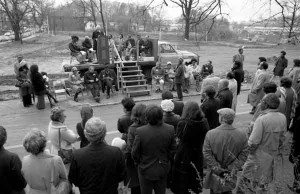The Peoplestown Project launched in December 2008 as a long-term endeavor to document and interpret the Peoplestown neighborhood’s history of community development and neighborhood organizing. We seek organizational records, photographs, personal accounts, and other historical documents that will help preserve and tell the history of neighborhood empowerment and the organizing traditions of the area. In our oral histories, we ask people questions like:
- What inspired you to join the city’s first welfare rights organization?
- Why did you decide to go on strike against your landlord?
- Tell me about delivering surplus food.
- Describe your arrival in Peoplestown. What did you see? What did you think?
- Now you have the property that was to become Emmaus House. What happened next?
- Tell me what you’d do when you went door-to-door.
- When did you hear about the possibility of a new Olympic Stadium?
We are particularly interested in the “storied” experience of Peoplestown and its community-based organizations. We know that stories help bind many people to this place and to each other. Stories are told and re-told, creating a local lore that links people over time and space. We’ve already heard many: the strength and tenacity of a welfare rights leader, vans breaking down at Zesto’s, sleep-ins at the Model Cities offices, singing hymns in the visitor gallery during a General Assembly session. We embrace, collect, and re-circulate those narratives, acknowledging their role in strengthening social networks and sustaining neighborhood life.
The Peoplestown Project also continually works to integrate Peoplestown’s history into public programming, co-curricular activities (like the summer arts program at Emmaus House), and the like, so that children, new residents, social service interns, and others will come to know the rich history of Peoplestown and its long-time residents. By preserving the stories of community organizing and neighborhood preservation and development, and by involving area residents in the documentation and interpretive process, we help continue Peoplestown’s history of fostering active citizenship by promoting and facilitating an engaged civic life.

